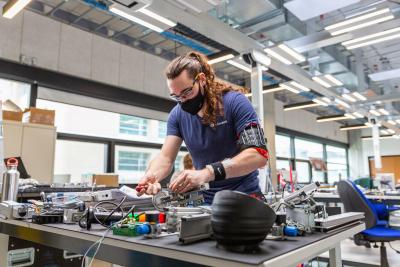A new, provincially funded micro-credentials course at Humber will equip workers with the advanced manufacturing skills necessary to get hired and progress in the industry – quickly. The funding provided by the Ontario government enables learners to apply for OSAP.
The RapidSkills, Advanced Manufacturing Micro-credentials program is for people who are unemployed, underemployed or those who have prior credentials and need their skills officially recognized, like new Canadians.

Many upskilling programs require hours of in-class learning and a structured schedule, but learners in the program have the flexibility to study on their own time. As a result, they can continue working, caring for their families and fulfilling their responsibilities while improving their employability.
The stackable micro-credentials include:
Technical skills
Mechatronics Control Systems
Electro Pneumatics and Hydraulics
Electric Motors, Actuators, and Drives
Program Logic Controllers (PLCs)
Lean Manufacturing & Quality Control Systems
Advanced Manufacturing Project
Essential Skills (i.e., resilience, communication and critical thinking)
Learners have about two weeks to work through the theoretical portion of each micro-credential on their own. Then, after they’ve completed the required online learning, they attend a lab at Humber’s North campus for a practical exercise where they demonstrate the skills they’ve learned in a hands-on environment.
“If you’re super keen to get all the theory done fast in a week, then that following Saturday and Sunday you can go and do the lab component. If it takes you two weeks, you can do it the next weekend,” said Dave Smiderle, associate dean of Continuous Professional Learning & Project Management Ontario Graduate Certificate and the Supply Chain Management cluster.

Learners will complete hands-on, practical tasks to prepare them for roles like machine operators, maintenance staff and manufacturing technicians or technologists.
By the end of the 19-week program, learners will complete a project as a group, using industry-standard simulation software to present their advanced manufacturing solution.
Industry benefits
The micro-credentials program responds to industry needs, too. In fact, some employers have asked Humber College to train new employees once they’re hired because it is so difficult to find workers with the appropriate skills.
Others look forward to hiring learners right out of the program.
“Humber College produces many high-quality graduates, and Mother Parkers has had great success with the Humber graduates that we’ve hired to work in our plants. With the continued growth of skilled roles in manufacturing, we believe that those completing this Advanced Manufacturing Rapid Skills program will be in high demand,” said Janet Nagy, senior human resources business partner at Mother Parkers.
“As Mother Parkers continues to grow and expand, we will be following the program’s development and turning to Humber to recruit graduates for our manufacturing facilities if opportunities come available.”

The in-person labs will be held at Humber’s North Campus, allowing learners to use state-of-the-art advanced manufacturing equipment.
At the end of the program, students will attend an employment and networking event with industry professionals and employers looking for candidates with their newly honed skills.
Programming success
Several groups collaborated to create the micro-credential program, including experienced industrial trainers, college professors and recent graduates.
“We try to be inclusive and get the best of the best. All these people help develop the course materials in a project-based learning program,” said Hamid Karbasi, president and CEO of Neatco Engineering Services Inc.
Karbasi and his colleagues worked with programmers from Continuous Professional Learning at Humber to develop the highly interactive online modules.
“We paid great attention to developing materials that are understandable, easy to read and yet very practical. We tried to make it intuitive so they can relate it to examples they find in their daily life.”
The first cohort of the Advanced Manufacturing Micro-Credentials program starts in February.
More information about the Advanced Manufacturing Microcredentials.